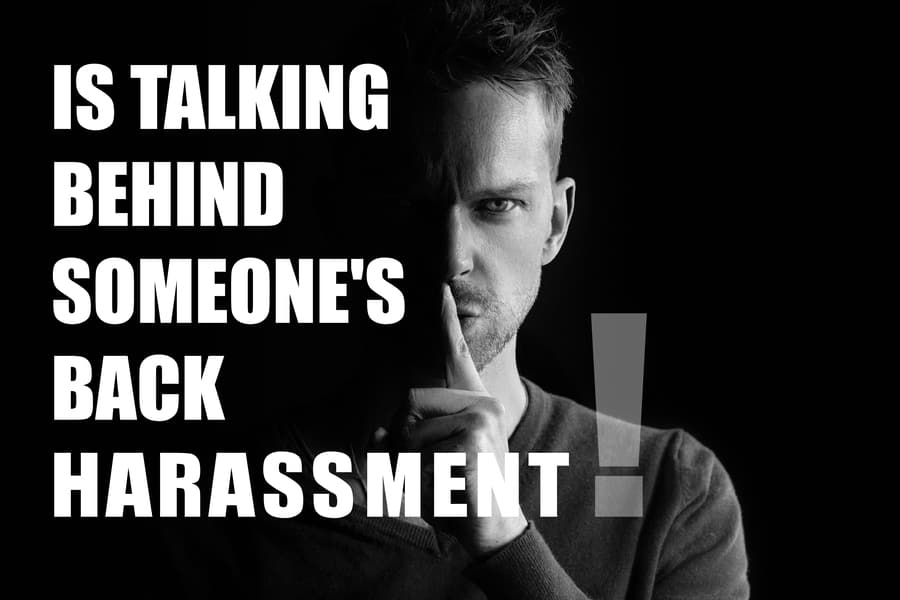In any workplace, you are bound to encounter people with different personalities and work ethics. Some of your colleagues will rub you the wrong way, and not always in a good way. Co-workers can be tricky to navigate at times. You may not like them or their habits, but these are all adults that you need to continue working with for the foreseeable future. That being said, there are several ways to cope with co-worker dynamics without stooping to their level. Talking behind someone’s back is an unfortunate reality in many work environments. It’s never pleasant when we find out that someone has been saying things about us that aren’t true — especially when those things aren’t nice. Read on for more information on whether talking behind someone’s back is indeed harassment, along with advice on how to handle the situation if it happens to you.
Is Talking Behind Someone’s Back Harassment?
No. Talking behind someone’s back does not mean you are harassing them. However, what you say about that person is important, as it could affect their lives in a negative manner. If you are going to say something about someone, make sure it’s true and beneficial to them. If you don’t know them well enough to judge their character, leave the conversation alone.
Why Does It Matter If Someone Talks Behind My Back?
- So you’ve discovered that a colleague has been talking behind your back. You have several choices from that point:
- You can confront the person who’s talking about you and ask them to stop.
- You can confront the person who’s been talking about you and tell them that it’s not okay.
- You can ignore what’s been said, or only confront the person who’s been talking about you when they mention you directly. There are plenty of ways to deal with a colleague who has been talking behind your back and isn’t doing it with care. However, you need to first decide if it matters to you. If you’re not sure, ask yourself these questions:
- Who is talking about you? – What are they saying? – How often does it happen? Once you’ve answered those questions, you should have a better idea of whether or not the situation is worth addressing.
What Constitutes Talking Behind Someone’s Back?
- When people talk behind your back, they are doing so in secret and without your knowledge. As such, it’s important to clarify exactly what qualifies as talking behind someone’s back. When someone talks about you without letting you know that they’re doing so, they’re either gossiping about you or sharing a private conversation with someone else.
- Gossiping is a less malicious way of talking behind your back than sharing a private conversation with someone else. Gossip can be defined as sharing information that’s not directly relevant to the workplace with people who don’t need to know that information.
- It’s often critical of the individual being gossiped about, but it doesn’t do any real harm. On the other hand, sharing a private conversation with someone else behind your back can be seriously damaging. This happens when someone shares a private conversation they had with someone at work, such as your manager, with you. When someone shares a private conversation with you with someone else, they’re not only gossiping, but they’re also breaching confidentiality.
When Is Talking Behind Someone’s Back Harassment?
- When people talk behind your back, it can definitely be uncomfortable, but it isn’t a true form of harassment. Harassment is a more serious action that can negatively impact your career and your mental health.
- If your co-workers are talking behind your back and using language that crosses into sexual harassment or racism, that’s a problem.
- Sexual Harassment – Sexual harassment occurs when a colleague uses sexual language or makes unwanted sexual advances to you.
- This can include leering, crude jokes, and more. Racism and Discrimination – If your colleagues are discriminating against you because of your race, religion, sex, or any other part of your identity, that’s not only a form of harassment, it’s illegal.
How to Respond to People Talking Behind Your Co-Worker’s Back?
- If you hear someone talking about a colleague behind their back in a malicious way, then it’s best to try and diffuse the situation by saying something like “I don’t think that’s very fair. I think you should apologize to her.” If you don’t feel comfortable doing so, then it is best to wait until they have finished talking and then address the issue in private with your colleague. If the person being talked about is uncomfortable with what was said or if they feel as though it has been malicious, then they can always speak up and ask for an apology.
- If the person who made the comment is not willing to apologize, then it’s best to speak with your manager or HR department about the issue. If someone makes a derogatory remark about your sexuality, race, or religion, then it’s important to try and address it in a respectful way. If you feel uncomfortable doing so alone, then you can ask a colleague to join you so that they can speak up on your behalf. However, if you feel comfortable doing so alone and want some advice on Make sure that what you say is not offensive in any other way (i.e., don’t swear or use derogatory terms). – Keep your voice calm and collected. – Try to find some common ground with the person you’re speaking to. – Don’t lose your temper. – If you feel uncomfortable, then it’s best to leave the room.
- If someone makes a derogatory remark about your sexuality, race, or religion, then it’s important to try and address it in a respectful way. If you feel uncomfortable doing so alone, then you can ask a colleague to join you so that they can speak up on your behalf. However, if you feel comfortable doing so alone and want some advice on how to say something in a respectful and professional way, here are some tips: – Address it directly. – Make comments that are factually accurate (i.e., don’t make assumptions). – Make sure that what you say is not offensive in any other way (i.e., don’t
- If you are aware of the fact that people are talking behind your colleague’s back, the best thing to do is to let it go. You don’t want to get involved in the drama behind their back and be the person who is telling your colleague what people are saying about them behind their back. If you know someone is talking about your colleague behind their back, then you should also try to let it go. The best thing to do is to confront the person who is doing it and tell them to back off. If it’s a colleague you have a good relationship with, then you could try to lighten the mood and change the subject. If you have a good relationship with the person and they are a good friend, they will usually appreciate you trying to defuse the situation and get everyone to lighten up.
Tips for Dealing with Colleagues That Talk Behind Your Back
- Remain Calm: When someone is gossiping about you, it can be tempting to confront them and tell them off. The problem with this approach is that it’s not only confrontational and unprofessional, but it also allows for room for the gossip to continue. If you decide to confront your colleague, do so calmly and with respect.
- Keep a Diary: If you’re getting fed up with hearing gossip about yourself from various people, keep a diary. This way you can write down the gossip you’ve heard and whom you’ve heard it from. This will help you keep track of the gossip and make you less inclined to confront the people who are gossiping about you because you’ll already have it recorded.
- Ask Someone You Trust: If you can’t decide how to handle co-worker gossip, ask someone you trust to help you figure it out. You can even ask your manager if you feel comfortable doing so.
Conclusion
When your colleagues are talking behind your back, it can be annoying, but it’s not a true form of harassment. If they’re using derogatory language or making unwanted sexual advances, however, that is harassment. If you’ve discovered that a colleague has been talking behind your back, you have several options for how to respond. You can confront the person who’s been talking about you and tell them that it’s not okay. Alternatively, you can ignore what’s been said and only confront the person who’s been talking about you when they mention you directly.








